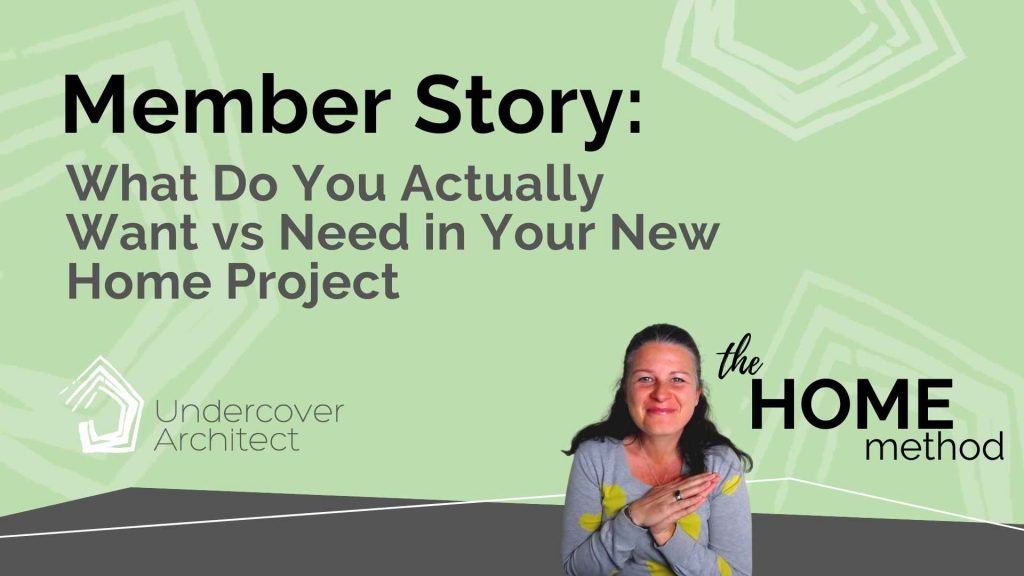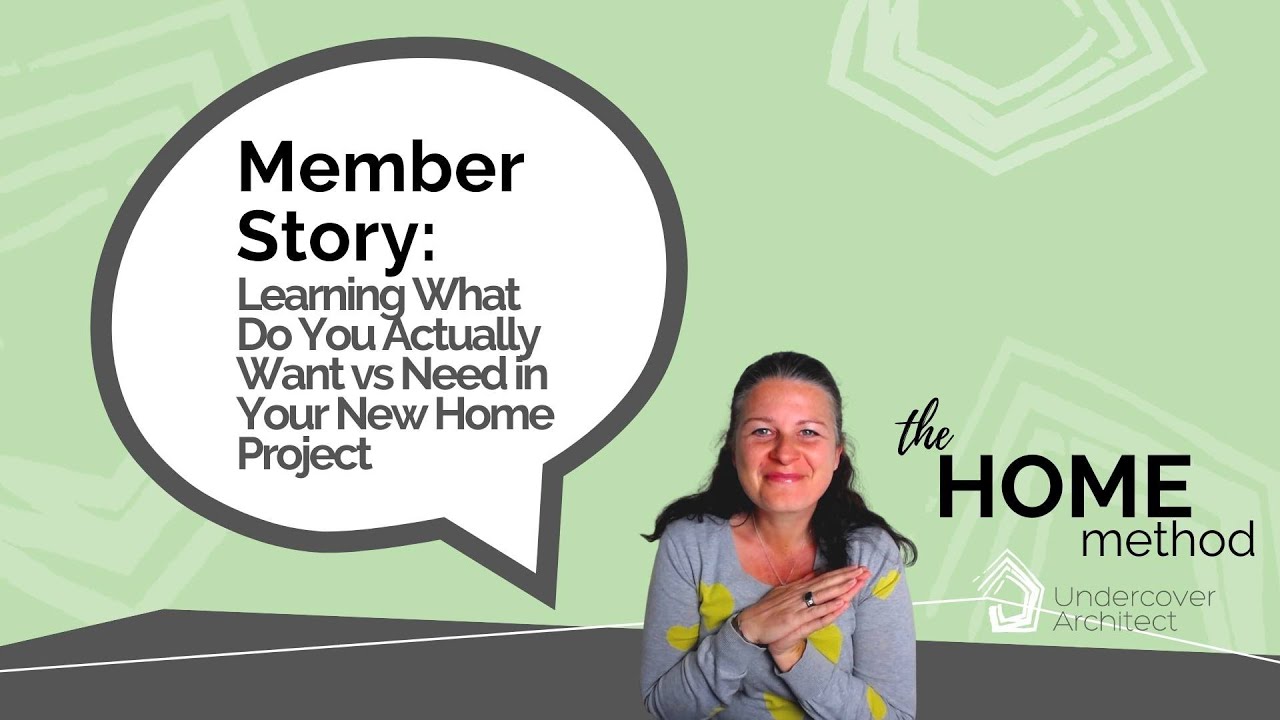
Rebekah was able to make educated decisions about her wants vs her needs in her new home project through the expert advice she accessed inside the Undercover Architect program.
Listen as Rebekah shares how she navigated her new home build project, and how she learned to prioritise her own wants and needs in her project journey.
Through Undercover Architect’s online program she gained the clarity and confidence to ask challenging questions and hold true to what she wanted.
So my name is Rebekah and I’m from Perth, Western Australia. I actually began the course with Undercover Architect when I was living in the Pilbara region, which was 1,600 kilometres from where my house was actually situated. And I had seen the Undercover Architect’s videos on social media.
So I started looking into it and decided to do the new build webinar online. I think that was what attracted me the most, was the fact that I could actually dial in and I could do everything remotely over the internet. And I started watching some of her little videos. And I guess just listening to what she had to say about building and relationships with contractors.
So, it pretty much started from there. And I actually signed up and did the new build course … I think it was two years ago now.
What made you decide to join the Undercover Architect online courses?
Well, I chose to do the courses because it was, the content was delivered remotely. And I could take my time to review the information to ensure that when I started the construction build, I was aware of my responsibilities and obligations and also understood the process.
So one of the key criterias that I had for my build was that I wanted to recycle as much of my existing home as I possibly could. And then once I started down the Undercover Architect new build journey, there was a session where they started talking about the Owl Woods house.
And they started talking about passive design for a house and what does it actually mean. And I had been speaking to some builders about double glazing the house and in Western Australia, we have quite a hot, I guess, climate. And to me, it just made sense that we started building a house with double glazing and everyone that I spoke to said that they could make the floor plans work. I didn’t need double glazing, of course, solar orientation would be taken into account.
I just found that they were telling me what they thought I wanted to hear and not what I actually wanted.
So when I started going through all the web, and all the podcasts on Undercover Architect, I started figuring out what I really wanted was a custom build. And I wanted a house that suited my purposes, not just a mass produced home.
How have you benefited from doing Undercover Architect’s courses?
I don’t think I would have had the depth of conversation that you need to have with the builder. I had lots of conversations about what exactly was involved in my build, and where the costs and expenses of the build was sitting.
I don’t think I would have had such open engagement and such positive engagement with my builder and architect unless I’d done this course.
Amelia really sets out the fact that both parties have obligations to each other, and to keep the communications open. And I think it just enhances the work that you do. And it makes you more cognisant of what you need to know going in.
So you haven’t, you know, I had a three hour meeting with a builder to talk about costs and to actually talk about what he’s going to build. And how’s that going to look? And how does he run his site?
Especially if I did things remotely and I wasn’t able to meet up on a weekly basis, then what else could I do to get that oversight on the job? So there’s things like that, that take into your, I guess, individual circumstance? And makes you think about what you really want out of that job.
And also, what do you really want out of your house? I mean, some of the steps that you go through really questions how big a piece of land do you need? And, and how big a house do you need? And how do you use that space? And what does that need to do for you? And how do you maximise the space that you have already?
What challenges were you worried about before you started?
I just had a really challenging block of land in regards to orientation and slope. So I always knew that was going to be a factor. And I wanted a house that I could age in place, is what we call it.
So every house that I looked at didn’t really meet what I wanted and they were way too big. And so I really addressed those. And also I had a budget constraint. So I only wanted to spend X amount of dollars on my budget to build my property.
And when I realised that the block was going to push that budget because of the amount of stability I needed, you know. It was an easy decision to make to not progress the job then because I, I felt I pursued this, and I knew exactly what I wanted and if I wasn’t going to get what I wanted then I didn’t want to build the house.
How did you first discover Undercover Architect?
It was a little while ago now, and I’m pretty sure I had seen Undercover Architect on social media. And I saw a, just a single episode podcast and I listened to it.
And I thought, this is fantastic because I can listen to this remotely and not have to be in a set location to hear this information.
And she was really positive about ensuring that you have a good relationship with your builder and that you go into the situation with your eyes wide open, and actually really understanding what needs to happen on every job.
What made you decide to join the Undercover Architect online courses?
I think when I started to have a look at how much information is in the podcast, and it stepped out into various episodes, and it covered everything from being a home, a home builder, through to a new build to a renovation.
And it was delivered in such a timely format that I thought, well, this is exactly what I want to pursue. And it really fits my needs of being a new home builder.
And there’s some really great information in just the free podcast that I’ve even heard that I thought, well, if I’m getting value from a free podcast, the actual course itself wasn’t overly expensive. So I considered it to be a reasonable cost to make sure that I actually understood what I was walking into.
So if you want to follow a really structured approach, there’s avenues for that but then if you want to just pick up certain things, and you can absolutely go back.
And then if you want to go back and re-review something or listen to something again, you can do that as well. And you can also print some of the pages off to follow the guides on some of the information as well.
What are you doing differently because of this Undercover Architect course?
I think UA has really empowered me to ask the really difficult questions. And questions I think, I didn’t realise I could ask about the builder and about the architect.
And I also think it gave me the courage to really push back to make sure that what was being delivered was the product I actually really wanted.
And I think finally, and probably most importantly, helped me really narrow down what I wanted in a property and in a house. And what did I need to meet my happiness kind of level for life.
So, you know, you go in thinking, I need to build this size house and it needs to look this way for resale. But when you go down the UA path, you start to go, I don’t need that much space, this is what I really need.
And regardless of resale, resale is a whole other matter. But you really start to narrow down what do I actually need to have to live in a house to be comfortable and to make, to make me happy? And that really comes out of the UA processes. You really narrow that down.
Did the Undercover Architect course save you drama + stress?
I think the UA system, there’s checklists. So when you start in any of the processes, there’s all these checklists that can help you really narrow down what needs to happen. And you use it as a bit of a guide on the process.
So you know, I did spend money on the architect phase, and I also paid the builder to appropriately scope and cost my build. And I don’t regret it.
I even had a conversation with the architect about selling his plans and what that would mean, and whether or not he would consent to that. And I, I probably wouldn’t have had that conversation without UA.
You definitely have this guide and checklist to help you make those sort of decisions. And give, give you that courage to kind of really ask those questions. If something doesn’t work out, well then how do I recoup the costs? What do I do in this situation? There’s lots of scenarios of where things have gone wrong. And you can also go back to the forum group and check in and see if anyone else has had the same problems.
What would you say to others thinking of joining this Undercover Architect course?
I think if you’re going to invest and spend a lot of money on a property, you want to do it right the first time. And make sure that you understand what you really need, and what you are going to be paying for.
And the Undercover Architect or the UA process will help you understand what you need, and what your obligations are.
So I think it’s very valuable. Especially if you’re unsure as to what the process is. Or even if you’re building with a bulk or a high volume builder, it’s always worth doing the course to understand what you need to do to streamline the process, and to take the stress out of the build project.
Look, I gained a lot of value out of going through the UA course.
I would go back repeatedly and have a look at certain podcasts, re-review some of the documentation purely because I would go off and have a think about, do I really want this? Or do I really want that?
And it really made me realise that I was building a house that was way too big for what I really needed. It was, and that I guess, the solar passive was a free kick, it’s something that you can do with very little cost, and achieve massively out of the end of the project.
So there’s certain things like, I think, for me, I really got out of it was just the fact that it really made me think about what I wanted in a home, and how I wanted to live in that home.
And that’s invaluable because even if you don’t go down the path and build or renovate, when you go to look for the home that you want to live in, you know exactly what you’re looking for.
Yeah, and look, you know, in Australia, we build massive houses that are 300 square metres. We have so much space, so people think why not? And when you go through the course and you start really looking at what you do. How do you use the space? How does this support you to live the life you want to lead?
Quite often, you know, you don’t need such a big home, and you just need to be smarter about how you use what you’ve got. So it is a really great course for that.
And, you know, there’s options where you can seek advice from Amelia herself as well as the forum groups. And, everyone’s always very keen to share the knowledge that they gain. And you know, things like even hiring an interior designer saves you money.
Yes, it costs you up front. But at the end of the day, they save you time and effort. And you got someone else listening to what you want. And they’re translating it for the builder. So then there again, speaking the same language for you.
So yeah, look, you know, it’s really good to help you advocate as well to get what you need and give you options. If you’ve got communication breakdowns, it gives you options about what you can do and other avenues to pursue things.
So it’s a really great course and I definitely recommend it for people.

 With over 30 years industry experience, Amelia Lee founded Undercover Architect in 2014 as an award-winning online resource to help and teach you how to get it right when designing, building or renovating your home. You are the key to unlocking what’s possible for your home. Undercover Architect is your secret ally
With over 30 years industry experience, Amelia Lee founded Undercover Architect in 2014 as an award-winning online resource to help and teach you how to get it right when designing, building or renovating your home. You are the key to unlocking what’s possible for your home. Undercover Architect is your secret ally
Leave a Reply